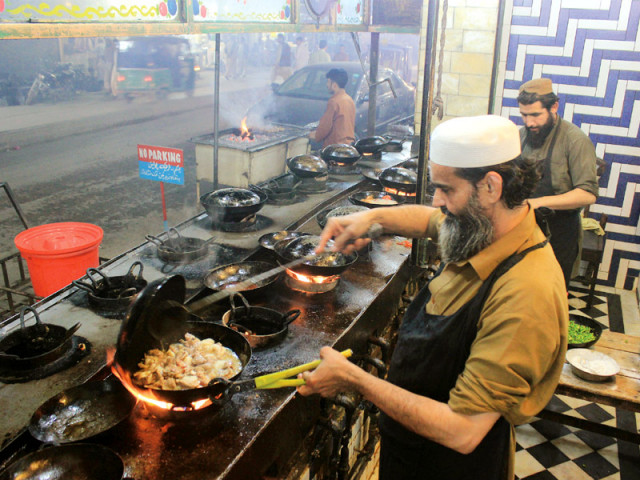Namakmandi in Peshawar: Worth your salt
Namakmandi in Peshawar teems with good food and happy customers.

Namakmandi in Peshawar teems with good food and happy customers. PHOTO: HIDAYAT KHAN
The Namakmandi that takes its name from the salt trade in the region was formerly known as Mewamandi because of the flourishing business of fruit merchants. Along with being a haven for food lovers, the sprawling food market has also carved out space for gem dealers. Nearly 50 gem shops beckon customers with their crushed and polished precious and semi-precious stones that are exported and supplied countrywide.
“The street hasn’t lost its traditional charm,” says Nasir Khan, owner of the oldest shop famously referred to as the ‘Charsi tikka wala’. Sitting on a charpoy amid the aroma of namkeen karhai, Kabuli pulao and Dum pukht, Khan elucidates on his shop’s reputation. “It was my father who… would take charas, though not frequently, therefore his shop [became known] as the ‘Charsi tikka wala’. It is now my registered trademark,” says the 58-year-old while sipping on Peshawari kahwa.
Khan says his is the authentic Charsi tikka, asserting that all other restaurants operating in the city by his name are ‘fake’. His claim is almost validated by the dozen honorary certificates and pictures taken with visiting celebrities that line the shop walls but stories of fame are similar for the more than 30 tikka shops scattered along the food street. Each of which is contesting to serve the authentic dish perfected over the years by generational cooks.
But good food comes at a price. Lamb costs Rs800 per kg and is a favourite among customers ordering karhai. “It is the increasing prices of mutton that is affecting our business as it is now unaffordable for the common man who visits my tikka shop,” Khan acknowledges. Despite soaring food prices, shop owners have decided to keep their doors open for people who frequent the Namakmandi. After action was taken last year by the Peshawar High Court over rising complaints of adulteration, mostly against chapli kebab houses for using substandard oil such as animal fat, business in the food street has been slower than usual.

“We are taking huge sums of money from customers, how we can provide any substandard stuff?” argues a shop owner Sultan Khan. “There is huge competition among the dozens of shops, providing substandard [quality] means you have lost your [reputation] earned after decades of hard work,” he says. Shops owners are now careful about preserving the reputation they have nurtured over six decades. At the Charsi tikka house, the mutton arrives after being stamped by the food department on a daily basis.
With quality control assurance, praise for the food is endless, drawing people time and again to the mandi. “We have a lot of memories associated with the area, compelling us to visit whenever we come to the city,” says a customer Akbar Khan, suggesting the best time to visit is after sunset when the place lights up with laughter and burning coals from barbeque stands. While expressing his love for barbeque and concerns over consuming cholesterol rich foods, he says, “Another reason to visit is that it is the only food street in the city with experienced cooks in these traditional dishes. It is people’s love for this city [famous] for mutton that has helped the business flourish.”
While there is no substitute for the experience of feasting on a charpoy under the open sky, many prefer home delivery. Shops have even launched their websites for this purpose. “A single shop receives about a dozen orders via phone calls during the night,” says Riaz, who has been cooking food at the mandi for six years.
Even though several international chains have taken up a significant share of the food market in most Pakistani urban centres, the consistent din of customers at the Namakmandi is testimony to the constant tussle between tradition and globalisation.
Hidayat Khan is a Peshawar-based reporter for The Express Tribune.
He tweets @hidayat_khan26
Published in The Express Tribune, Sunday Magazine, May 4th, 2014.













COMMENTS
Comments are moderated and generally will be posted if they are on-topic and not abusive.
For more information, please see our Comments FAQ